The nature of real estate may put agents at risk in the age of COVID-19 but many are taking sensible steps to protect themselves from possible infection, according to a new survey from Juwai.
The international property portal spoke to agents from more than 60 countries to gauge the impact of the pandemic on the global real estate industry.
The results indicate that most agents expect their 2020 earnings to be negatively impacted, while also believing that real estate activity by all consumer groups is down, and forecast the crisis will last at least three months.
On the other hand, agents everywhere feel this is an excellent buying opportunity.
Juwai coronavirus real estate survey - At a glance:
- More than 80 per cent of residential real estate agents around the world say the coronavirus epidemic has cut their 2020 earning expectations, with loss of earnings a problem present in all of the more than 60 countries from which the panellists hail.
- In Singapore, 88 per cent of agents expect to make less
- Worldwide, 18 per cent of agents report foreign buyers are one of their strategies.
- Twenty-six per cent of agents worldwide say their number one tactic is to isolate themselves by working at home rather than going into the office.
- 68 per cent of agents worldwide believe this is a “good” time or “very good” time to buy.
- Agents believe the coronavirus pandemic will last months rather than weeks, with 62 per cent of agents predicting the impact of the pandemic on their real estate market will last longer than three months.
Coronavirus Driving Agents’ Earnings Down
Eighty-two per cent of residential real estate agents around the world say the Coronavirus epidemic has cut their 2020 earning expectations.
Loss of earnings is a widespread problem present in all of the more than 60 countries from which our panellists hail.
According to Juwai, 82 per cent of residential real estate agents around the world say the Coronavirus epidemic has cut their 2020 earning expectations.
Loss of earnings is a widespread problem present in all of the more than 60 countries from which the panellists hail.
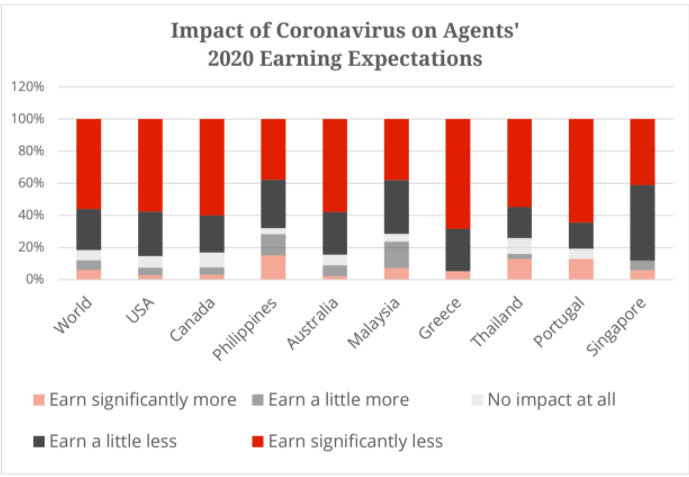
Of those surveyed, Greek real estate agents have the worst outlook, with ninety-five per cent of Greek agents expecting the Coronavirus pandemic to cut their earnings in 2020, with two-thirds of those forecasting they will earn "significantly less."
In an additional five countries besides Greece, more than four out of five agents expect to earn less in 2020 due to the Coronavirus epidemic.
In Singapore, 88 per cent of agents expect to make less.
The share of Singapore agents who expect to earn "a little less" is, at 47 per cent, larger than the 41 per cent who believe they will make "significantly less."
In Australia, 84 per cent of agents expect to earn less in 2020. The split is similar as in the USA.
The share of Australian agents who expect the negative impact on their earnings to be “significant” is more than twice the share who expect it to be moderate, at 58 per cent vs 27 per cent, respectively.
In Thailand, 74 per cent of agents expect to earn less in 2020, with 55 per cent planning to earn "significantly less" and 19 per cent expecting to earn "a little less."
Malaysian and Philippine agents are the least pessimistic among those we surveyed.
In Malaysia, 74 per cent of agents expect to earn less in 2020, with 38 per cent expecting to earn “significantly less” and 33 per cent expecting to earn “a little less.”
In the Philippines, 68 per cent of agents expect to earn less in 2020 due to the Coronavirus, with 38 per cent expecting to earn “significantly less” and 30 per cent expecting to earn “a little less.”
Agents to invest more in Foreign Buyer Marketing
One of the strategies agents will use to preserve their incomes as much as possible is to invest more in marketing to foreign buyers.
Worldwide, 18 per cent of agents report foreign buyers are one of their strategies.
Perhaps because of the relative significance of foreign buyers to their markets, agents in the Philippines and Portugal are the most likely to report plans to do so.
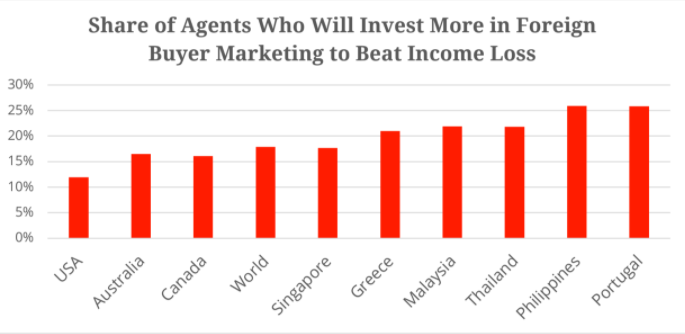
Source: Juwai
In both the Philippines and Portugal, 26 per cent of agents plan to increase their foreign buyer marketing.
In Malaysia and Thailand, 22 per cent of agents will increase their investment in marketing to foreign buyers.
How agents are protecting their health
Real estate agents worldwide are taking similar steps to protect themselves from falling ill or from unwittingly passing the Coronavirus to another person.
Twenty-six per cent of agents worldwide say their number one tactic is to isolate themselves by working at home rather than going into the office.
Using hand sanitizer and washing one’s hands is the second-ranked tactic and chosen by 24 per cent of agents.
Agents’ third-ranked tactic, selected by 18 per cent of respondents, is to prevent obviously sick individuals from touring listings or attending meetings.
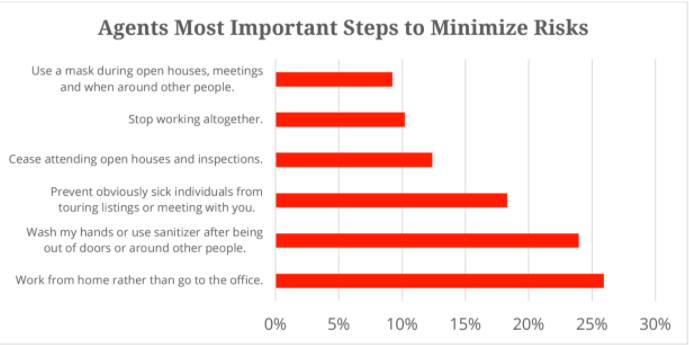
Source: Juwai
For twelve per cent of agents, the number one tactic is to cease attending open houses and inspections.
Stop working altogether is the top tactic for 10 per cent of agents, while 9 per cent of agents say their top tactic is to use a mask during open houses and meetings and when around other people.
Agents strategies for avoiding contagion seem to closely match medical advice, which suggests we avoid close contact with other individuals and practice good hygiene.
Agents expect at least three months' market impact
Agents believe the Coronavirus pandemic will last months rather than weeks.
Worldwide, 62 per cent of agents predict the impact of the pandemic on their real estate market will last longer than three months.
Only 10 per cent of agents worldwide believe the impact will be limited to two months or less.
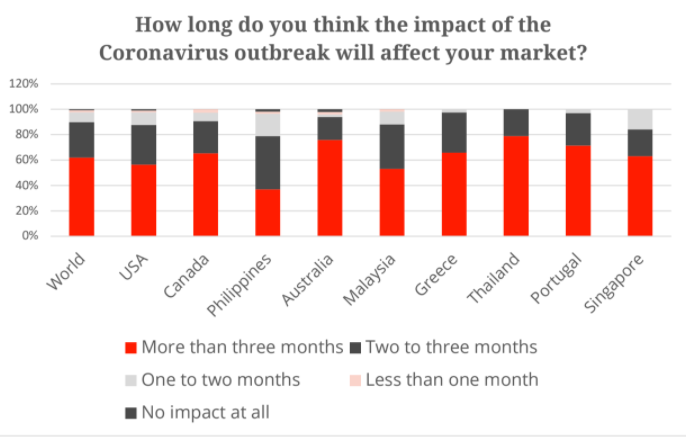
Source: Juwai
In Thailand, 79 per cent of agents believe the impact will affect their market longer than three months.
In Australia, 76 per cent of agents believe the Coronavirus will affect their market for more than three months.
It is 63 per cent in Singapore, 53 per cent in Malaysia, and 37 per cent in the Philippines.
Coronavirus drives down all real estate activity
Agents also report the impact of the Coronavirus has affected all consumer groups in the real estate market.
Worldwide, 29 per cent of agents say the Coronavirus has caused a "significant drop" in owner-occupier activity in their local market.
Forty per cent of global agents say foreign buyer activity has also fallen significantly.
Twenty-one per cent of agents report that renter activity has fallen significantly.
Investors seem relatively unaffected, with only 10 per cent of agents worldwide reporting that locally based investor buyers have reduced their activity in the market due to the Coronavirus.
In the Philippines, 30 per cent of agents say foreign buyer activity has suffered a significant drop, while 26 per cent report a similar drop in local owner-occupier and investor buyers, and 18 per cent report a drop in renters.
In Australia, 35 per cent of agents report a significant fall in foreign buyer activity, while 23 per cent report a similar drop in local owner-occupier activity, 27 per cent report the same in local investor activity and 14 per cent report the same in renter activity.
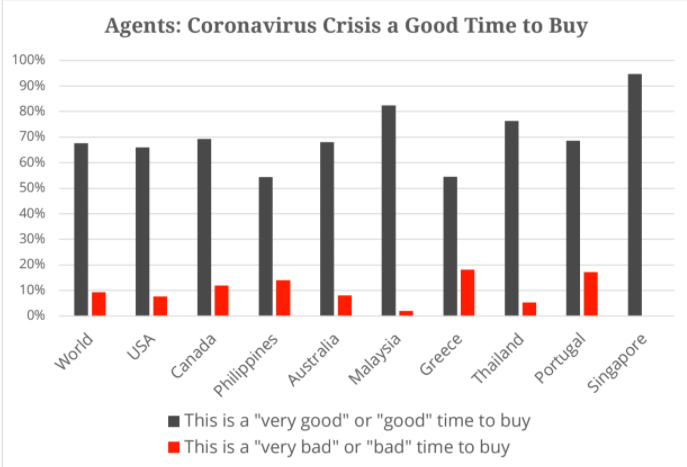
Source: Juwai
In Malaysia, 31 per cent of agents say foreign buyer activity has suffered a significant drop, while 23 per cent report a similar drop in local owner-occupier activity, 27 per cent report a significant drop in investor buyers, and 18 per cent report a drop in renters.
In Thailand, 30 per cent of agents say foreign buyer activity has suffered a significant drop, while 22 per cent report a similar drop in local owner-occupier buyers, 26 per cent report a significant drop in investor buyers, and 22 per cent report a drop in renters.
In Singapore, 47 per cent of agents report a significant fall in foreign buyer activity, while 18 per cent report a similar drop in local owner-occupier activity, 15 per cent report the same in local investor activity and 21 per cent report the same in renter activity.
Agents recommend buying, are mixed on selling
Agents are divided on whether the Coronavirus crisis is a good time to sell, but sentiment is much stronger that it is in fact a good time to buy.
With market activity much lower for all buyer groups, sellers or vendors may have to offer discounts or other incentives to attract buyers willing to make offers and close transactions while the coronavirus crisis is acute.
At the same time, agents retain faith in the real estate market’s long-term prospects and most believe prices will recover some or all of their Coronavirus losses after the crisis passes.
Buyers who can obtain a discount today will be rewarded later.
While 68 per cent of agents worldwide believe this is a “good” or “very good” time to buy, only 9 per cent of agents feel it is a “bad” or “very bad” time buy.
In every country, more than half of agents believe this is a “good” or “very good” time to buy.
The countries where agents are more negative than the global trend about selling during the Coronavirus crisis are Thailand, the Philippines, Canada, Malaysia, and Greece.
In Thailand, 32 per cent of agents believe this is a “good” or “very good” time to sell, but 53 per cent believe it is a “bad” or “very bad” time to sell.
In the Philippines, 28 per cent of agents believe this is a “good” or “very good” time to sell, but 51 per cent believe it is a “bad” or “very bad” time to sell.
In Malaysia, 35 per cent of agents believe this is a “good” or “very good” time to sell, but 47 per cent believe it is a “bad” or “very bad” time to sell.
More from Juwai:
Philippine agents ready to court Chinese buyers as the year of the White Rat begins
The boom to come?: Malaysian agents are 'bullish' on 2020, says Juwai IQI Group
Offshore gaming driving 90 per cent of residential transactions in key Manila districts: IQI Caliver














